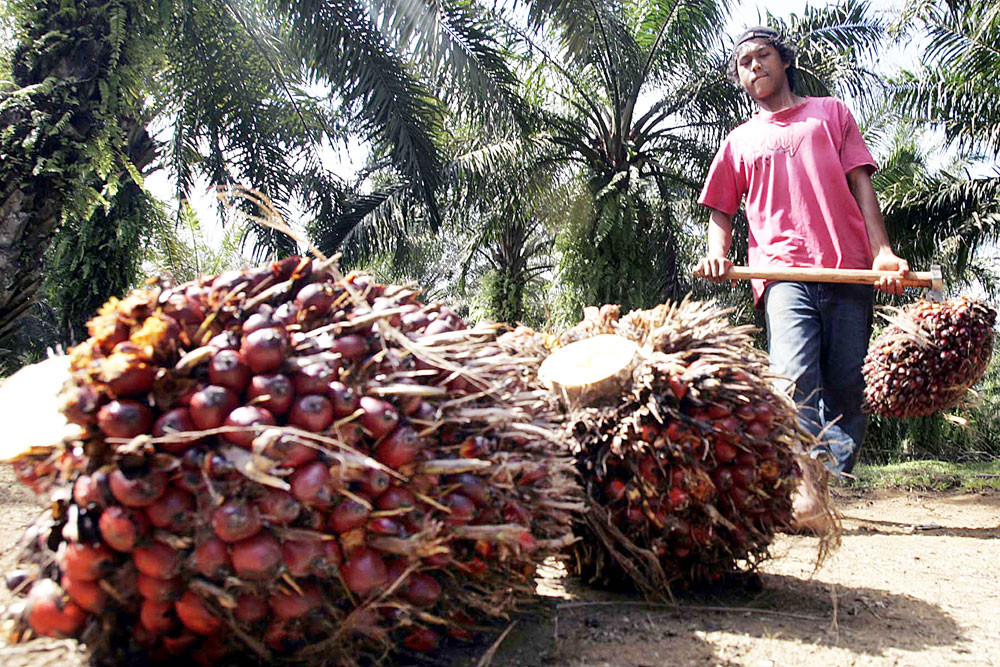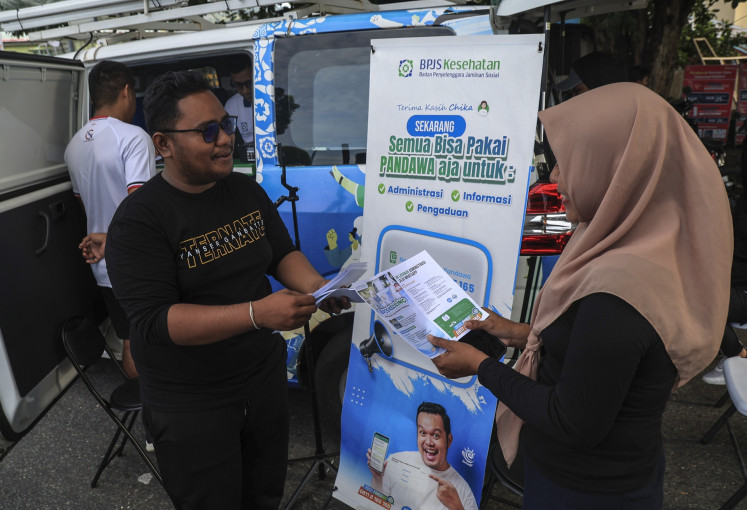Popular Reads
Top Results
Can't find what you're looking for?
View all search resultsPopular Reads
Top Results
Can't find what you're looking for?
View all search resultsIE-CEPA: Opportunities open but challenges still loom
With CEPA, thousands of products from Indonesia are now free from import tariffs to enter Norway, and Indonesia will gradually lower its tariffs to zero for products from Norway.
Change text size
Gift Premium Articles
to Anyone
 Harvest time: A worker gathers oil palm fruit bunches at a plantation in Lampung. Indonesia and Malaysia, the first- and second-largest palm oil producers, have threatened to challenge the European Union via the World Trade Organization if the EU continues to phase out palm oil from transportation fuel. (The Jakarta Post/R. Berto Wedhatama)
Harvest time: A worker gathers oil palm fruit bunches at a plantation in Lampung. Indonesia and Malaysia, the first- and second-largest palm oil producers, have threatened to challenge the European Union via the World Trade Organization if the EU continues to phase out palm oil from transportation fuel. (The Jakarta Post/R. Berto Wedhatama)
T
he enforcement of the Indonesia-European Free Trade Association (EFTA) Comprehensive Economic Partnership Agreement (CEPA) on Nov. 1 became a milestone in the relationship between Indonesia and Norway. After over 71 years of diplomatic relations between the two countries, this CEPA is the first agreement of its kind.
The route to the CEPA between Indonesia and EFTA states, which include Iceland, Liechtenstein, Switzerland and Norway, has been a long one. Starting from the launch of negotiations in 2010 with the first round of negotiations in the following year, through 15 rounds of negotiations and various expert meetings over the course of eight years, to the signing at the end of 2018 and the ratification from all the parties of this agreement earlier this year.
But an agreement without implementation from its stakeholders will only become an idle legal document.
We have seen how both Indonesia's and Norway’s economies have contracted in 2020 because of the pandemic and global economic slowdown. After over one and a half years of the COVID-19 pandemic, there is light at the end of the tunnel and we hope that this CEPA provides opportunities for Indonesia and Norway to recover stronger together through increased trade and investment cooperation.
Now, it is up to the business communities to maximize this agreement to the fullest, and for this reason, the Indonesian Embassy in Oslo held a hybrid business gathering on Nov. 1, not only as a ceremony to mark the entry into force of the agreement, but also to encourage businesses from both sides to take advantage of this CEPA.
As a broad-based free trade agreement, the CEPA covers trade in goods, trade in services, investment, intellectual property rights, procurement, trade and sustainable development and cooperation. Take, for example, trade in goods. With the implementation of the CEPA, Norway abolishes all customs duties on imports of industrial products, including fish and other marine products, from Indonesia. While on the other hand, Indonesia will gradually eliminate or reduce customs duties on industrial products, including fish and other marine products coming from Norway.
Being maritime nations, fisheries is just one of many sectors that show potential for growth between the two countries. With CEPA, thousands of products from Indonesia are now free from import tariffs to enter Norway and Indonesia will gradually lower its tariffs to zero for products from Norway.
In the past few years, Indonesia has experienced a trade deficit with Norway. But now, with over 90 percent of all tariffs being eliminated, there is much potential for Indonesian products to be more competitive in the Norwegian market and gain traction. In this respect, Norway may become a gateway for Indonesian products to enter into Nordic and European markets.
Investment is another important agenda for the CEPA, which aims to improve the legal framework for investors from all parties investing in each other’s countries. Through the CEPA, non-discriminatory rights of establishment or “commercial presence” are granted by the host country. Parties of the CEPA have committed various sectors and subsectors to be liberalized for investments from each party. Through the CEPA, Indonesia has opened its doors for investments in agriculture, forestry, aquaculture, mining, oil and gas, manufacturing and power generation, with a few conditions for maximum foreign ownership. With Norway being an outward-investment-oriented country for the last 20 years, there is much hope for increased foreign direct investments from Norway to Indonesia, which has not shown its true potential.
Tariff reduction and elimination are important and provide a competitive advantage for trade in goods, but non-tariff barriers still cause problems and disruptions in trade. It cannot be ignored that there are still barriers to trade for certain products between the two countries. Take, for example, palm oil and palm oil products from Indonesia.
Under the pressure and demand for sustainability and blame for deforestation, this Indonesian commodity continues to face barriers to entering the Norwegian market. With the ban on palm-oil-based biofuels in government procurement in Norway, consumption of palm oil has declined in recent years in the country.
It is important to note that sustainable palm oil businesses have complied and, therefore, non-tariff barriers should be eliminated, too. It is in this context that a call for free trade must be accompanied by fair trade. Ideally, the spirit of CEPA must be translated into free and fair trade.
On the other side, with the aim to protect its indigenous fish species from various diseases, Indonesia has also recently implemented a stricter policy for imports of Norwegian salmon, which has caused a temporary halt of imports from Norway to the Indonesian market. But there is still hope for surpassing these sorts of barriers, as the CEPA also outlines binding regulations and procedures that promote international standards, transparency and simplification of procedures for trade in goods.
A considerable number of investments from Norway to Indonesia that is at our doorstep also still faces challenges. With over 98 percent of its power coming from renewable energy, Norway has the expertise to support Indonesia in its endeavor to increase renewables in its energy mix.
Several Norwegian renewable energy companies are currently venturing into the field in Indonesia but have frequently expressed their frustration over the constraints they face to realize their investments in the archipelago.
The new Electricity Business Supply Plan (RUPTL) for the period of 2021-2030 signed by the Indonesian energy and mineral resources minister, which has put a lot of focus on renewable energy by targeting 51 percent of all new power plants built from renewable energy by 2030, attempts to deliver this renewed vision of a greener Indonesia. This is a step in the right direction, but more efforts will be required for this vision to become reality.
Further improvements and reform of the regulatory framework in the renewable energy sector, which provides clarity and stability of the investment framework including pricing/tariffs and the applicable procurement processes, will also be necessary for the realization of investments in the near future. There is much hope for this sector, with a new and renewable energy bill being deliberated in the House of Representatives and a new presidential regulation on tariffs and the procurement of renewable energy projects by PLN that has been under scrutiny for the past few years.
With these regulations on renewable energy in the pipeline, along with the Job Creation Law and its implementing regulations, and the CEPA, the regulatory framework for Indonesia will become clearer, stronger, and more reliable and attractive for foreign investors, especially those from Norway.
***
Todung Mulya Lubis is the Indonesian ambassador to Norway and Iceland. Aulia Rinaldi Ahza is the counselor for economic affairs at the Indonesian Embassy in Oslo.










